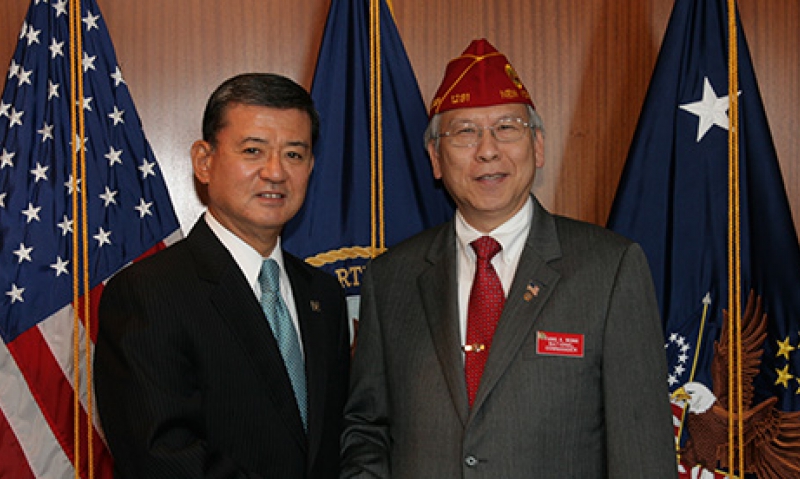
Commander Fang A. Wong and VA Secretary Eric Shinseki discussed ways to improve VA claims backlog and student veterans success on campus.
VA Secretary Eric Shinseki invited American Legion National Commander Fang A. Wong to meet with him Sept. 29 at the Department of Veterans Affairs (VA) in Washington. They discussed the importance of reducing the VA claims backlog, status of the Virtual Lifetime Electronic Record (VLER) project, and ways to help student veterans succeed on campus.
"We had a very cordial exchange," Wong said of his first conversation with Shinseki. "He was very open and I don't think he tried to sugarcoat anything. He took a lot of time to explain the background to some of my questions, which gave me a better insight into some of the (VA) programs."
VA has set a goal of reducing processing times of disability claims to no more than 125 days and increasing the accuracy rate of first-time claims processing to 98 percent. "When Shinseki took over at VA, the time length was about 180 days and the accuracy rate was somewhere in the low 80s," Wong said. "But he set a new target for 2015 that some observers felt was unachievable. The secretary's response to them was, ‘How do we know it's not achievable unless we try it?' And he promised his people some new tools to help them out, things like automating part of the claims processing system that would help eliminate redundancy and the possibility of creating errors. So he's making good on that."
Wong said the average processing time for VA disability claims is currently about 160 days and the accuracy rate "is somewhere in the high 80s." He told Shinseki that, from the Legion perspective, "We would rather see higher accuracy than faster speed." Shinseki replied that the two criteria were not linked in the process and were being addressed separately.
Shinseki also explained to Wong that automated improvements to the VA claims process had to be put on hold because solving the timely delivery of Post-9/11 GI Bill benefits to veterans became a higher priority. That, along with the addition of three more presumptive conditions for veterans exposed to Agent Orange herbicide, slowed VA's progress in addressing the department's one million-plus claims backlog. "With that decision, he opened the door for another quarter-million claims," Wong said.
Another topic of interest to The American Legion was the timeline for implementing VLER, which is designed to provide servicemembers and veterans with seamless electronic health-care records that can be easily accessed by VA and the Department of Defense. Shinseki said that he and Secretary of Defense Robert Gates have agreed to prioritize approaches to creating the VLER system. First, the departments will try to find an "off the shelf" solution. If that doesn't work, they will search for the best available software and database management systems in the public or private sectors. The final option is for DoD and VA to build their own system from scratch.
Wong said VA is running some pilot programs related to VLER but that no firm date has been set to introduce the system.
Shinseki asked Wong whether The American Legion was focusing on any particular issues during his one-year term as national commander. "I said that getting jobs for veterans was a top priority for us. But that one word - job - includes a lot of considerations and activities to make it work," Wong said. Such as thousands of veterans using their GI Bill education benefits to get degrees that will make them more desirable candidates for employment.
"Shinseki is very concerned right now about the dropout rate among student veterans," Wong added. "It's about 50 percent for the first year of college and that is federal money being wasted if they don't graduate. So he wants the Legion to help make sure that our veterans stay in school and earn their degrees. Because if they don't, a lot of them will be unemployed and some of them may eventually become homeless because they couldn't earn a living."
Wong said that Shinseki has contacted a good number of colleges and universities, encouraging them to reach out and help their student veterans succeed. "He has gone as far as exploring some kind of arrangement with these schools that would assign a VA staff person to each institution of higher learning in the country who would assist student veterans on campus - as long as schools provides adequate office space. That's about 60,000 more VA employees."
If there is anything The American Legion can do to help student veterans on a nationwide scale, Wong told Shinseki, "We could get local Legionnaires to visit these campuses as volunteers and offer assistance to veterans who may be having some problems, whether it is getting used to academic life or getting paperwork filed properly for GI Bill benefits."
Another thing that could help reduce dropout rates among GI Bill students, Shinseki told Wong, is for more upper classmen to reach out and help student veterans who are just beginning their college experience.
"The idea is good. Upper classmen who are veterans have a lot of common issues, including post-traumatic stress and how that may affect their academic performance," Wong said. "They can share their experiences and lessons-learned with the freshmen arriving on campus. If you find a group of veterans at school who have experienced many of the same things, then you can find some comfort in that kind of understanding that will make the transition easier. When these veterans come back and go to school, the older veterans need to get with them and help them - keep them focused and make sure they graduate."
- Commander

